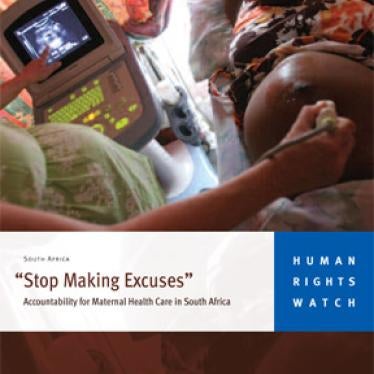Nomsa, a 20-year-old woman from Mthatha in the Eastern Cape, showed me a scar on her thigh. She said it came from a wound inflicted by a nurse at a community health centre in 2010. The nurse, Nomsa said, used a pair of scissors "to make me open my legs when I was in labour".
She was one of the more than 150 women from the Eastern Cape whom I interviewed between October 2010 and April this year as part of a Human Rights Watch project about their experiences with maternity care. I found that pregnant women and new mothers were abused regularly by health workers, especially nurses, who were supposed to provide them with care. Doctors, ambulance drivers and dispatchers -- and sometimes even cleaners and security guards -- also abused women, we found.
South Africa has one of the world's highest incidences of violence, including rape and domestic violence, against women. A study by Interpol estimates that, in South Africa, a woman is raped every 17 seconds and one in four South African women suffers domestic violence.
Violence has well-documented repercussions for victims but it is also a burden on the health system. The department of health has noted that violence is one of four elements in a "quadruple burden of disease" facing the healthcare system.
This year's 16 days of activism against gender-based violence comes at a time when the South African healthcare system is undergoing massive transformation to ensure that it can deliver the government's vision of "a long and healthy life for all South Africans", including changes to reduce the country's unacceptably high levels of maternal mortality.
Now is the time to address violence against patients, especially women seeking maternal care, and to make sure it comes to an end quickly.
Human Rights Watch documented many forms of abuse of pregnant women seeking healthcare. These include ridiculing or ignoring women's needs when in pain, especially during labour, unnecessary delays in providing treatment, leaving women to deliver their babies without help, accusing women who appear not to be following nurses' orders of wanting to harm their babies, verbal insults and degrading treatment, such as asking women to clean up their own blood, or intimidation and threats of harm. Physical abuse involves slapping, pinching, rough treatment and a deliberate refusal to give pain-relieving medication.
Sadly, these are by no means the only forms of violence committed against women in South Africa's health institutions, nor are women the only patients who are abused. Research into other reproductive health services, including abortion and prevention of mother-to-child HIV transmission, as well as general research about healthcare, shows that violence and indifference by health workers is a widespread and long-standing problem that continues to obstruct access to healthcare.
The government needs to address the poor conditions in public healthcare facilities that contribute to poor quality care and to the frustrations that lead health workers to lash out at the very people they should be helping. These include heavy workloads, poor management and supervision systems, lack of accountability, inadequate equipment, lack of medical supplies and low morale linked to poor pay for some healthcare workers.
As the government addresses these problems, here are some steps it should take. It should emphasise ethics, caring, communication and women's reproductive and sexual rights both in recruiting healthcare workers and in training them. It should create a system of mentoring and strategies to increase staff motivation as well as better management and supervision of health facilities.
At the same time, the government should improve health-system accountability by providing effective complaint mechanisms for patients and by holding health workers who abuse patients accountable for their actions.
The government, particularly Health Minister Aaron Motsoaledi, has shown a genuine willingness to reform South Africa's healthcare system and seems to have taken some steps in the right direction. Nevertheless, a lot remains to be done to guarantee women good quality maternity care in public facilities and to save them from unnecessary suffering and avoidable deaths.
Ensuring that women can get these services free from violence and fear will be a true sign that South Africa is honouring its commitment to women's rights.








